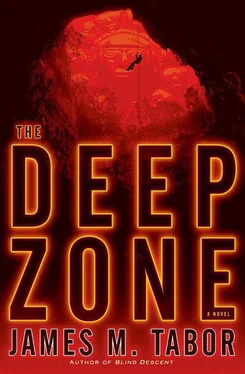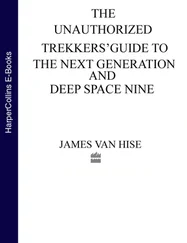“Like the rapture of the deep, in diving?” Arguello asked.
“No. Most divers experience that—nitrogen narcosis is the real name—as euphoria. Some have taken off their masks and tried to talk to fish, others believe they can breathe water. It’s like a five-martini buzz. The Rapture in a cave is like, well, like the worst anxiety attack you can imagine, multiplied tenfold. Just the opposite of euphoric: horrific .”
“It sounds perfectly delightful,” Arguello said. Hallie stared—it was the first time he had tried to say something funny. Defusing fear, she knew, but that was fine—whatever worked.
“To continue about the cave,” she said. “I’m assuming we all know the standard expeditionary caving drill: vertical work, diving, breakdown, squeezes, gas pockets. Right?”
She got the nods she wanted.
“Good. So let’s talk about the major obstacles in Cueva de Luz. First one’s a big wall.”
“What is ‘big’?” Bowman, professionally curious.
“About five hundred feet, lip to pit.” Haight whistled, and even Bowman looked impressed. Cahner and Arguello exchanged worried glances.
“That’s the Washington Monument,” Cahner said.
“Right. Lots more drops of fifty to seventy-five feet each. At least one long flooded tunnel and maybe more, depending on recent rainfall. After that, the usual big-cave nightmares: squeezes, lakes, breakdown, rotten rock, some pockets of carbon dioxide and hydrogen sulfide, and probably a few others I’m forgetting.”
“What provisions for our rescue if something happens?” Arguello asked.
“There are no rescues from deep in a cave like Cueva de Luz.” Bowman, announcing grim news as if it were a weather report. “For one thing, there’s no communication. For another, if you get hurt far down in a cave like that, evacuation is not a possibility. Vertical walls, flooded tunnels and sumps…” He shrugged. “We will be on our own. From start to finish.” Though he was giving them facts that would unsettle most normal people, she found his words, or maybe the way they came across, reassuring, and it appeared the others’ reactions were similar. The power of a natural-born leader , she thought.
Her eyes kept flicking back toward Bowman. Something about the man was pulling her. It wasn’t purely his looks. He struck her as one of the toughest, most intimidating men she’d ever seen up close. Well, all right, it might have a little to do with the way he looked. But there was something else, intangible and ineffable, a pull like two magnets just close enough to generate attraction. And his eyes, his intense, hypervigilant, unwavering eyes, which seemed to be looking out from some great depth.
Which was when she realized the others were all looking at her looking at Bowman. She cleared her throat, continued: “The main thing to understand about Cueva de Luz is that we don’t really understand it. We know more about the moon than about supercaves like this one.”
“Hey, y’all did have some problems down there. Care to enlighten us?” said Haight, leaning back in his chair, hands folded over his belt buckle.
“It’s true,” Hallie said. “We did have some trouble.”
“Like two ol’ boys never came back.”
She swallowed. “Yes.” Who else among these guys would know what happened? Bowman, almost certainly. Al did. And Barnard. And Lathrop would. So it would be news only to Arguello.
“What was it, then? Where they spelunker types or what, Hallie?”
Serious cavers derided casual enthusiasts, called them spelunkers. Cavers rescue spelunkers , went the saying.
“They were good expeditionary cavers.”
“So what happened to ’em, then?”
“We don’t know.”
“Y’all don’t know ?”
“We never found them. They were exploring a side passage and never came back. We searched for two full days and nights. No trace.”
Ten minutes later she finished telling her colleagues everything she knew, which really wasn’t much. No one spoke for a moment. Then Arguello did.
“Now I will tell you some more things about Cueva de Luz. Cuicatecs have inhabited that region for a thousand years. The cave is sacred to them. The place from which all life flowed in the Great Beginning. For them, the cave is a living thing. They call its spirit Chi Con Gui-Jao. It is a place of great power.”
“What kind of power?” Cahner asked.
Arguello thought for a moment before responding. “Many kinds. Chi Con Gui-Jao guards the entrance to the underworld. He can take a spirit to La Terra de los Muertos, Land of the Dead. Or send it back to Tierra de la Luz, Land of the Light.”
Cahner started to speak again, but Lathrop went first. “If I may. There will be time for this later, but now we need to focus. Are there any questions?”
Haight’s hand went up. “I have one. I’ve been into some very big caves in my life, and to descend the vertical drops y’all described will take thousands of feet of rope that’ll weigh hundreds of pounds. Too much for a small team to carry. How will we get down and up?”
“That’s my department,” said Bowman. “We won’t be needing rope.”
“Y’all aren’t suggestin’ we BASE-jump the drops, are you? We still have to get back out.”
Arguello grimaced. “I do not know how to do that and have no desire to learn.” Arms folded across his chest, he shook his head slowly back and forth.
“It would take too long to explain now. But we won’t need rope.” Bowman looked at each of them in turn. “Trust me on this one.”
Hallie watched their reactions. The others seemed willing to do that. And so, somewhat to her surprise, was she.
“One last thing,” Lathrop said. “We will have a small special operations team staged near Brownsville. Two-hour response time. But they are only for extraction from the surface, not rescue from the cave.”
“Whoa, there.” Haight held up both hands, like a cop stopping traffic. “I got a few more questions about little things like equipment, food, communications. An expedition like this would normally take months to organize.”
Lathrop was ready. “We don’t have time for ‘normal.’ You saw the pictures of ACE victims. We have, at the very most, ten to twelve days.”
“And those things are taken care of.” Bowman again.
“Righto, then. Any idea how long we’ll be underground?”
“We have planned for seven days,” Bowman said. “Two days to reach the bottom of the cave, one day there to collect material and rest, and three to come back out again. Plus one extra.”
Lathrop looked around. “Thank you for your patience. Any more questions?”
“Just one more.” Haight, hand up. “Really. Then I’ll stop. Earlier y’all said, if I remember aright, we were picked ’cause we could get security clearances and we all had serious cavin’ skills and such.”
“Correct.”
“Y’all also said, ‘and a coupla other things.’ ” He doesn’t miss much , Hallie thought. She remembered the phrasing now, but only after Haight had brought it up. Haight looked from Lathrop to Barnard and back to Lathrop. “I was just wonderin’ about those ‘coupla other things.’ ”
Lathrop and Barnard exchanged glances. Barnard nodded slightly.
Lathrop said, “Well, as a matter of fact, there were some other criteria.”
They waited. He looked at the floor, then back at them.
“You are all unmarried, live alone, and have no children.”
No one spoke. But Hallie thought: In other words, expendables .
THEY SPENT THE NIGHT IN GUEST ROOMS AT ANDREWS AIR Force Base. The next morning, after showers and breakfast, they were jetted to a military airfield at Reynosa, Texas. There they were outfitted with the caving equipment they would need: scuba rebreathers, mil-spec meals ready to eat (MREs), redundant lights, exposure suits—the best of everything that advanced research could create and government money could buy.
Читать дальше












